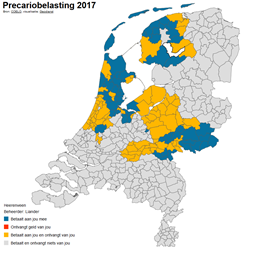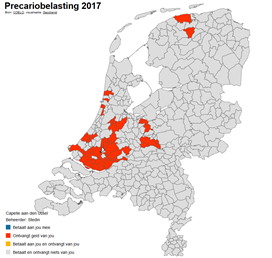Residents of Tytsjerksteradiel pay the levy to Rotterdam
In many municipalities, unbeknownst to them, residents pay levies to municipalities in which they may never set foot. They do so via a municipal levy on encroachments in, on or above public land (precariobelasting) on conduits, a hidden tax that households pay through the regional network managers. Today, COELO (the University of Groningen’s Centre for Research on Local Government Economics) is publishing an interactive map to show people exactly which municipality (or municipalities) their taxes are going to, and which residents are paying towards amenities in their own municipality. The map is available on www.coelo.nl
Municipalities can charge a municipal levy on encroachments in, on or above public land for underground water, gas and electricity pipes and conduits. Drinking water companies charge their customers directly in the municipality levying the tax, but managers of the energy networks must divide the costs over all customers, even those who live in municipalities where there is no municipal levy on encroachments in, on or above public land on conduits.
Interactive maps
The interactive maps developed by COELO show every municipality whose residents have to pay other municipalities this levy. They also show the municipalities that receive levies for amenities from residents in a different municipality. Residents of Ameland, Alphen aan den Rijn and Aalten, for example, pay levies in Heerenveen (see figure 1).

- Residents of the blue municipalities pay taxes to Heerenveen
- Residents of the yellow municipalities pay taxes to and receive taxes from Heerenveen
- Residents of the grey municipalities pay no taxes to and receive no taxes from Heerenveen
Residents of Capelle aan den IJssel, in another example, pay levies in Rotterdam, Dongeradeel and Veenendaal, even though the municipality itself does not charge a municipal levy on encroachments in, on or above public land (see figure 2).

- Red municipalities receive tax revenues from Capelle aan den IJssel
- Residents of the grey municipalities pay no taxes to and receive no taxes from Capelle aan den IJssel
Meer informatie
- Corine Hoeben, COELO researcher
________________________________________________
> More news from the Faculty of Economics and Business
> FEB experts in the media


| Last modified: | 29 February 2024 10.02 a.m. |
More news
-
16 December 2024
Jouke de Vries: ‘The University will have to be flexible’
2024 was a festive year for the University of Groningen. Jouke de Vries, the chair of the Executive Board, looks back.
-
10 December 2024
Research by Statistics Netherlands (CBS) and the University of Groningen finds possible circumvention of sanctions against Russia by small, young businesses
Dutch goods exports to Russia fell sharply after the European Union scaled up sanctions in 2022. At the same time, Dutch exports of sanctioned goods increased to seven countries with an increased risk of sanction circumvention. A striking number of...
-
26 November 2024
New Research Highlights Cost-Saving Benefits of Lifestyle Behavior Change App
A study conducted by researchers from the Faculty of Economics and Business (FEB) of the University of Groningen has found that the use of the SamenGezond app, offered by health insurance company Menzis, is associated with a notable reduction in...
